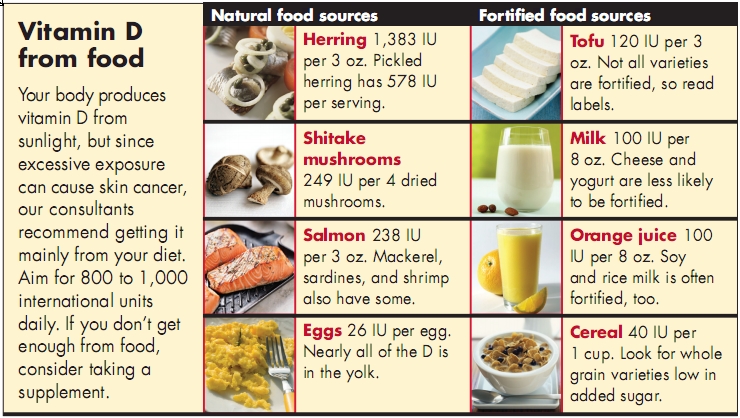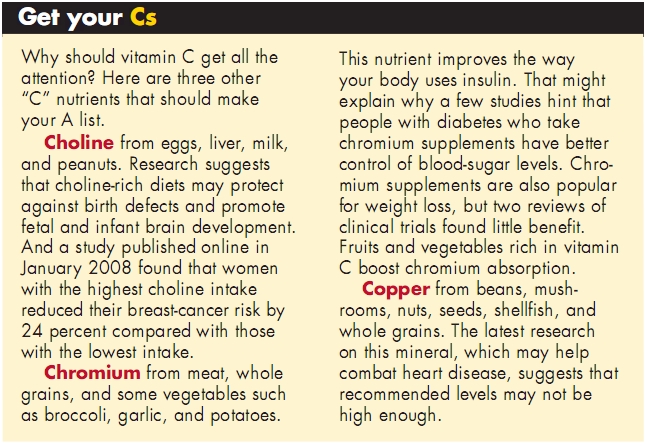Is Your Diet Up To Par?
Consumer Reports 'On Health'
Vol 20 No 9, Sep 2008
Consumer Reports 'On Health'
Vol 20 No 9, Sep 2008
Smarter food choices and judicious use of supplements can fill nutrition gaps and help ward off disease.
The American diet is full of holes. The vast majority of us don't get enough vitamin E. About 50 percent of Americans don't consume the recommended amount of magnesium. And vitamin D shortages are so common that some doctors now recommend testing many people for possible deficiencies. Those shortages can damage DNA and the structures that support cell growth, possibly leading to premature aging and degenerative diseases including cancer and dementia.
Swallowing a lot of vitamin and mineral pills might seem like the best solution for nutritional shortfalls, but that's usually not the case. Unlike foods, pills can provide toxic quantities of certain nutrients. Moreover, they are turning out to be poor surrogates for a healthy diet. Observational studies that have linked higher intakes of a nutrient to reduced disease risk are being discredited by more definitive clinical trials that either find no benefit or increased risk in people who take the nutrient in supplemental form. The latest disappointments include certain B vitamins, which a recent study found did not decrease the risk of heart attack in high-risk women, and some antioxidants, which a large review found might actually increase the risk of premature death.
Those results underscore how little we know about how the various components of food interact. "The observational evidence is overwhelming that richly colored foods reduce the risk of cardiovascular disease and cancer," says Irwin Rosenberg, M.D., professor of medicine and nutrition at Tufts University in Boston. "But the idea that we can reproduce that in pills is flawed. It's becoming increasingly apparent that there are a lot—probably thousands—of substances in food that we haven't identified yet."
The ideal diet is varied, rich in fruits and vegetables, whole grains, and low-fat dairy products plus modest amounts of fish and low-fat meat and chicken. That meal plan provides nearly all the nutrients that most people need. For those who have trouble regularly consuming healthful foods—such as dieters who avoid carbohydrates or consume less than 1,200 calories daily or strict vegetarians—a daily multivitamin can help fill the gaps. And older people and those with chronic diseases might eat healthfully but still need higher amounts of certain nutrients.
Here's a rundown of some of the latest research on vitamins and minerals and our experts' take on areas where even conscientious eaters might need help.
Vitamin D
The hottest nutrient under the sun

Two main factors have prompted some doctors to start measuring their patients' blood level of vitamin D. Research has found that more people than previously thought have low levels of this vitamin, and there's growing evidence that those low levels might contribute to a host of illnesses and even premature death. Once thought of primarily as a partner with calcium to form and maintain strong bones, it turns out that vitamin D plays a key role in other systems of the body, too, including muscles, the central nervous system, immune function, inflammation, and cell growth and reproduction.
The strongest evidence is in the area of bone health. In a comprehensive review of 167 studies, the government's Agency for Healthcare Research and Quality found that people who got at least 700 international units of vitamin D daily and took calcium pills had denser bones and experienced fewer falls and fractures. Population studies suggest that higher levels of vitamin D may also protect against certain cancers, including those of the breast, colon, and prostate. Other research has linked high intake or blood levels of the vitamin with reduced risks of heart attack, both types of diabetes, and multiple sclerosis, as well as stronger immunity. (See the box on page 1 for advice on how much vitamin D you need and how to get it.)
Testing guidelines are still evolving, and our experts say it's too soon to say whether everyone should be routinely screened for low blood levels of vitamin D. But testing is probably a good idea for people with conditions linked to abnormal calcium metabolism or vitamin D deficiency such as osteoporosis, hyperthyroidism, and possibly multiple sclerosis. And the higher your risk—based on factors such as your age, location, skin color, and weight—the more sensible vitamin D testing might become. If it reveals a deficiency, your doctor should consider prescribing a very high-dose supplement for two to three months, followed by a maintenance supplement to keep your vitamin D levels in a healthy range.
Vitamin K
A new understanding
Long known for its role in helping blood clot after you get a wound, it turns out that this nutrient also helps build strong bones. Two large studies, the Framingham Heart Study and the Nurses' Health Study, have linked lower intakes of vitamin K to a higher risk of fractures. And a study in the Feb. 1, 2008, issue of the American Journal of Epidemiology suggests that it might protect the bones and offer other health benefits, in part by reining in chronic inflammation. Some researchers think that the current recommended intake of 90 micrograms for women and 120 micrograms for men may be too low. The best dietary sources of vitamin K are green, leafy vegetables and canola, olive, and soybean oils. If you seldom eat K-rich foods, you might consider a multivitamin or calcium supplement that contains the vitamin. But talk with your doctor if you take blood thinners, which could be undermined by changes in vitamin K intake.

Calcium
More than just a bone builder
In addition to calcium's role in strengthening the skeleton, emerging evidence indicates that the mineral might also lower the risk of colon cancer, reduce cholesterol and blood-pressure levels, ease premenstrual syndrome, and possibly aid weight loss. But even if you regularly consume the recommended three daily servings of dairy products— which typically contain around 200 to 400 milligrams of calcium each—it's still a challenge to get the amount of calcium we recommend: 1,000 mg for younger adults and 1,200 mg for those 50 and older. People with weakened bones should talk with their doctor about getting 1,500 mg daily.
Other good food sources are dark, leafy greens and calcium-fortified versions of orange juice, tofu, or other foods. Be cautious with supplements because large amounts of the mineral can block the absorption of other nutrients, cause kidney problems, and possibly increase the risk of prostate cancer.
Choose pills according to what is cheapest, is most palatable, or requires taking the fewest tablets. The type of compound does not significantly affect its absorbability, despite some manufacturers' claims. But do look for supplements, such as the one in the illustration at left, labeled "USP Verified." They've been tested by the U.S. Pharmacopoeia for purity and potency.
 |
B
VitaminsHOME Extra may not help While a few trials have shown that supplemental B12 and folate lower circulating levels of homocysteine (elevated levels are a possible marker for increased cardiovascular risk), that hasn't paid off in a lower risk of heart attack or stroke. Why the discrepancy? It could be that the effect was more subtle than studies were designed to detect, or that the wide availability of folate-fortified foods now has made supplements superfluous. High doses of folic acid also didn't pay off in a three-year clinical trial of people with a history of precancerous polyps in the colon or rectum. And despite the claims of fortified-drink makers, extra Bs won't give you an energy boost. "Yes, you need B vitamins to extract energy from food," says Patrick Stover, Ph.D., director of nutritional sciences at Cornell, "but that doesn't mean that adding more will give you extra energy if you're in good health." In fact, the only groups who may need supplements are strict vegetarians who miss out on B12 in animal-derived foods; people older than 50, who often lack the stomach acid needed to extract the B12 in food; and women of childbearing age, who need additional folic acid to help prevent neural-tube defects in the developing fetus. The Antioxidants Thumbs down on supplements Despite scores of clinical trials, supplements of antioxidant vitamins, minerals, and other plant chemicals have been unable to duplicate the health-promoting qualities of colorful produce. In an analysis that combined the results of 67 previous antioxidant trials involving more than 230,000 participants, the only positive result was a reduced risk of mortality noted in some—but not all—of the trials that tested the mineral selenium. Vitamin C appeared to have no effect, while beta-carotene, vitamin A, and vitamin E supplements were actually linked to an increased risk of death. |
Magnesium
The overlooked mineral
This mineral plays a crucial role in regulating blood pressure, blood sugar, and calcium metabolism. Several large observational studies suggest that a high dietary intake can strengthen bones as well as reduce the risk of heart disease and type-2 diabetes. Other research shows that it may help ease migraines and that high magnesium levels may help people fall asleep faster and sleep more soundly. That's another reason to eat green leafy vegetables, legumes, nuts, and whole grains.
Copyright © 2008 by Consumers Union of United States, Inc.